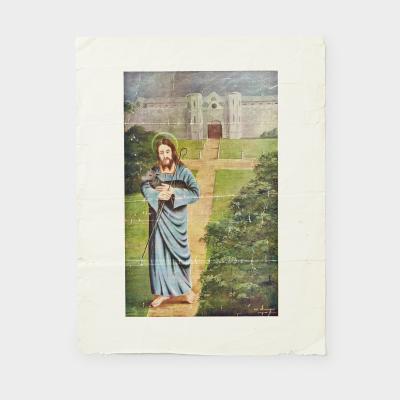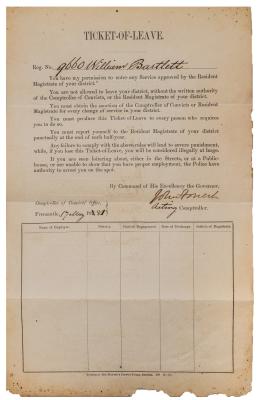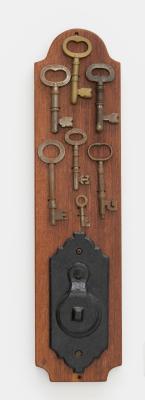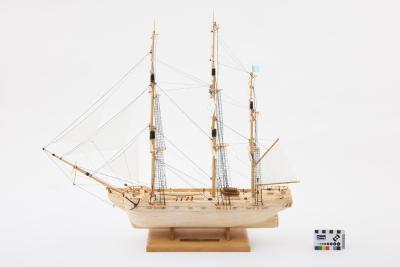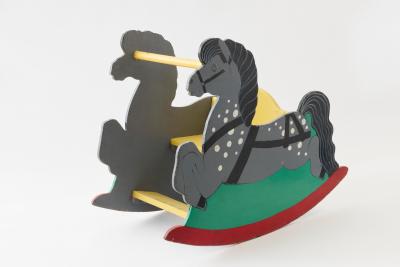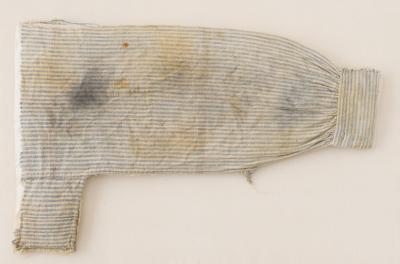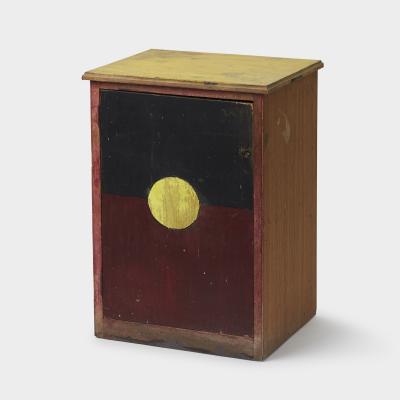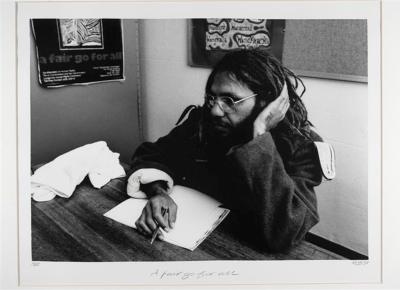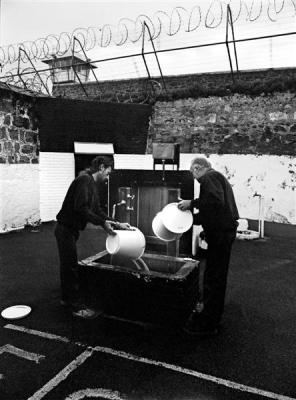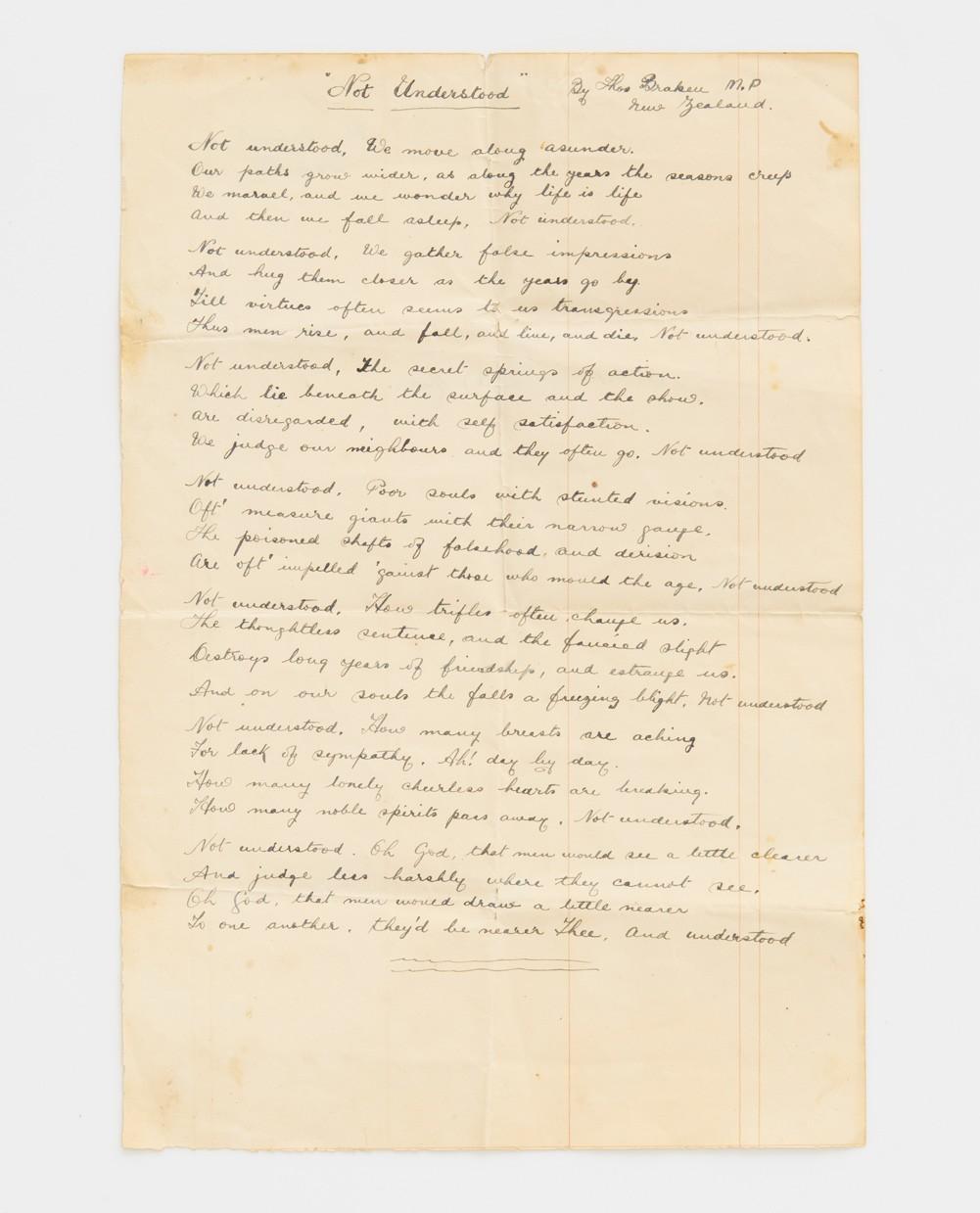POEM, COPIED BY ERNEST 'SHINER' RYAN
1942Large, single sheet of white paper, with handwritten poem titled 'Not Understood', by Thomas Bracken, written by Shiner Ryan. Single sheet of large, cream coloured paper with faint red printed columns running vertically on the front and back of the page. On one side of the paper, handwritten in cursive script in black ink, is the complete poem titled 'Not Understood', accredited 'by Thomas Bracken, M. P./ New Zealand'. On the reverse side of the page in the top left corner, hand written in blue ink is 'Shiner Ryan/ Written in Fremantle/Jail'. In the top right corner, also written in blue ink, is 'The convict/Fremantle'. Hand written in the centre of the page, in cursive script in black ink, is 'Written from memory 1942/ Ernest A. (Shiner) Ryan'.
Bill Allerton (full name William Edward Allerton) donated this handwritten poem, entitled ‘Not Understood’ and credited at the top of the paper as being a poem by Thomas Bracken, M.P., New Zealand. On the reverse of the page is another handwritten note detailing that this poem was copied from memory by Ernest A. ‘Shiner’ Ryan in 1942. Bill saw an article in the West Australian newspaper on 12 November 2016 about the new exhibition at Fremantle Prison, titled Reform, which included information about Shiner Ryan. After seeing this article, Bill thought the Prison may be interested in having this handwritten poem
.
The poem belonged to Bill’s grandfather (William Thomas Edward Allerton) and was then passed to Bill’s father (William Edward Thomas Allerton) before being passed on to Bill. Bill believes his grandfather came by the poem when Shiner Ryan would do gardening work at his house on Harris Road in Palmyra. Bill believed that Shiner was on some form of ‘day release’ or working scheme where he would do work in the community before returning to the Prison at night. When Shiner was released from Fremantle Prison, Bill remembers him visiting his grandfather and grandmother (Annie Allerton) to say goodbye before Shiner moved interstate. Bill was approximately 5 years old at the time and was at his grandparents’ house when Shiner came for that visit and remembers it distinctly.
The two handwritten notes on the back of the poem in blue ink were written by Bill’s mother (Ella Line Allerton, née Chetwynd) when the poem belonged to her husband (Bill’s father). It records that this poem was written by Shiner Ryan whilst he was incarcerated at Fremantle Prison.
Details
Details
'Not Understood', 'by Thomas Bracken, M. P./ New Zealand', 'Shiner Ryan/ Written in Fremantle/Jail', 'The convict/Fremantle', 'Written from memory 1942/ Ernest A. (Shiner) Ryan'.
Ernest 'Shiner' Ryan was a criminal who served time in Fremantle Prison in 1905, and again from 1932-1936 and 1938. Born in 1886, his criminal career began at an early age, when he was first charged with larceny at the age of 16. He is famous for being the first criminal to use a motor vehicle in a getaway after he and Samuel Freeman robbed the Everleigh railway workshop in Sydney, during 1914. Ryan looked after the Gatehouse clock until his release around 1940.
Following his release, Ryan was noteworthy for donating a painting of his, titled 'The Reclamation', of which 400 copies were made and sold to raise funds for the Fremantle Citizens' Reception Council, an organisation that provided entertainment for serving troops. The painting was completed while Ryan was imprisoned, and 'symbolises the Saviour showing his love for mankind by reclaiming a black sheep of society - a prisoner who has just been released from gaol.' He also made model boats from glass, sand, and other available material. The Kathleen Anne was named after a friend.
Shiner married Kate Leigh in 1950. They separated 6 months later. Ryan died in 1954.
More items like this
Other items from Fremantle Prison
- TICKET OF LEAVE
- PLAQUE WITH KEYS AND PEEPHOLE
- Matchstick model of the Hougoumont
- Convict Establishment Baton
- Rocking Horse
- SET OF KEYS ON RINGS
- Convict Shirt Sleeve
- BEDSIDE CABINET
- SHIV
- Clay Pipe
- A FAIR GO FOR ALL: EDUCATION, 10.40AM
- 6.55AM MESSING OUT: DIVISION 1, EMPTYING MESS BUCKETS IN YARD SINK
